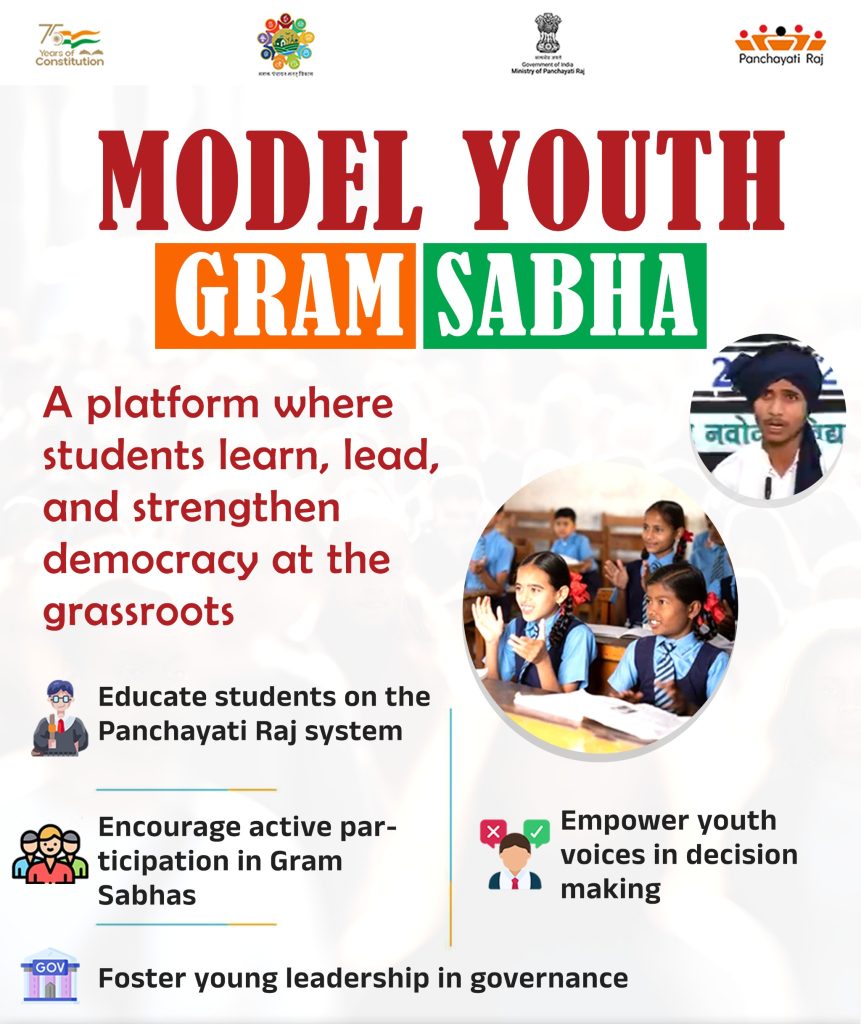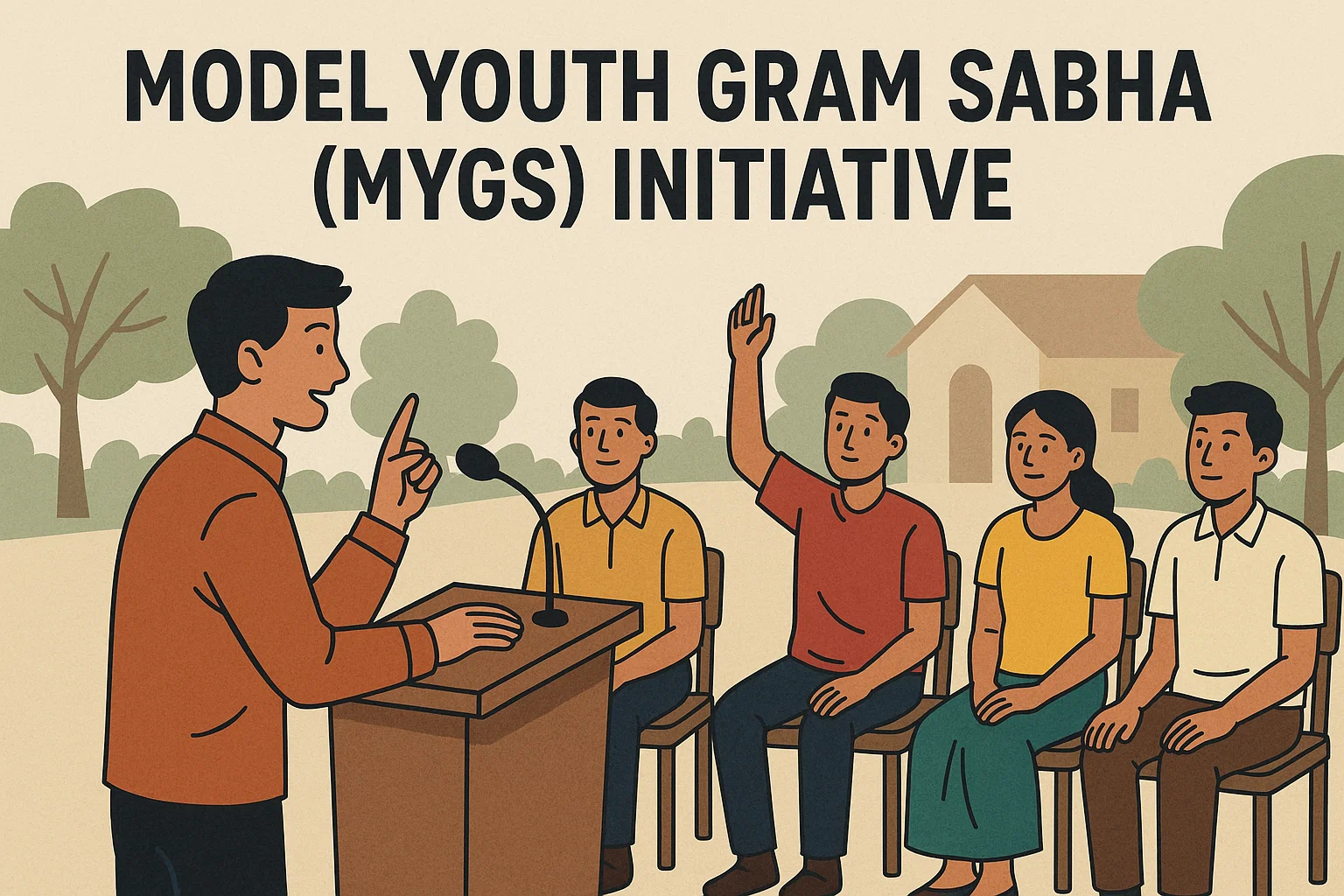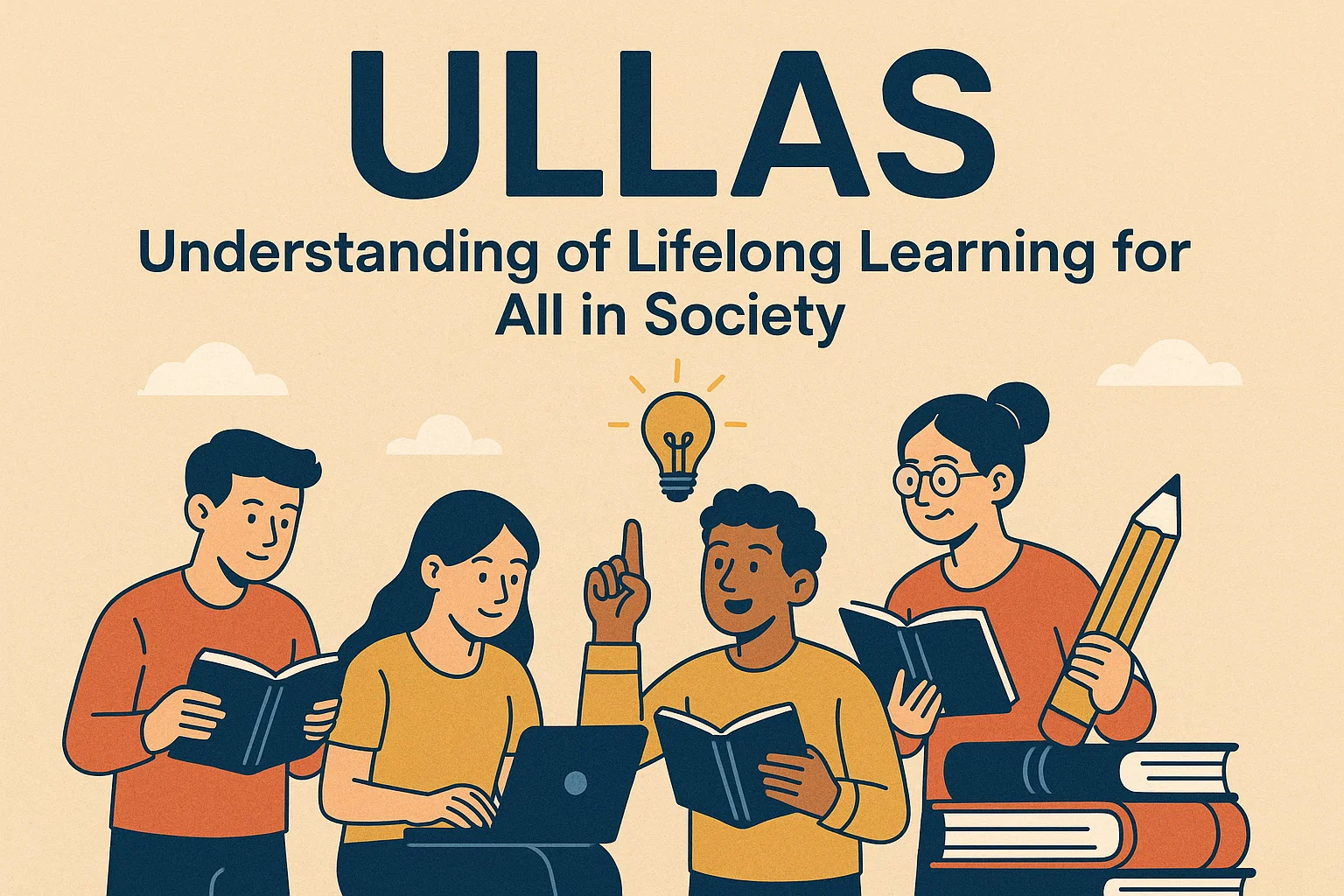Model Youth Gram Sabha (MYGS) Initiative
The Model Youth Gram Sabha (MYGS) simulates Gram Sabha meetings, empowering students with civic skills, grassroots governance experience, and democratic values.
Context:
Modelled on the lines of popular simulations like the Model United Nations (MUN), the Ministry of Panchayati Raj in collaboration with the Ministries of Education and Tribal Affairs, is set to launch the Model Youth Gram Sabha (MYGS) initiative.
What is the Model Youth Gram Sabha Initiative?
The Model Youth Gram Sabha (MYGS) is an experiential learning program designed to simulate the functioning of a real Gram Sabha—the bedrock of India’s Panchayati Raj system. Key features include:
-
- Target Audience: Students from classes 9 to 12 in identified schools.
- Simulation Roles: Students assume the roles of key village-level functionaries such as the Sarpanch, Ward Members, Village Secretary, Anganwadi Worker, Auxiliary Nurse Midwife (ANM), and Junior Engineers.
- Core Activities: Participants conduct mock Gram Sabha meetings where they discuss and deliberate on a range of typical village issues—from water supply and sanitation to education and healthcare. They are tasked with preparing a village development plan and budget, mirroring the actual responsibilities of a Gram Sabha.
-
Phased Implementation:
-
- Phase 1 (Starting Oct 2025): Coverage of about 1,100 schools, including all Jawahar Navodaya Vidyalayas (JNVs) and Eklavya Model Residential Schools (EMRS), plus selected Zilla Parishad schools in Maharashtra and Karnataka.
- Phase 2: Expansion to schools run by state governments.
-
Competitive Framework:
The initiative includes regional and national-level competitions for JNVs and EMRS.
- The winning school in each category will receive ₹1 crore, the runner-up ₹75 lakh, and the third-place school ₹50 lakh. Each participating school will also receive a support fund of ₹20,000 to organise the mock Sabha.

What is Model UN and Model Youth Parliament?
-
Model United Nations (MUN):
An academic simulation of the United Nations where students step into the shoes of ambassadors from different countries. They research a country’s position, debate global issues (e.g., climate change, international security), draft resolutions, and navigate diplomatic negotiations. The goal is to understand international relations and the complexities of multilateral diplomacy.
-
Model Youth Parliament:
A similar simulation based on the national parliamentary system. Participants act as Members of Parliament, representing different political parties. They engage in debates on national issues, question ministers, and learn about legislative procedures, law-making, and the functioning of the executive and legislature.
How do they benefit society?
- Demystifying Governance: They bridge the gap between theoretical knowledge in textbooks and the practical, often messy, reality of how governance works.
- Building a Cadre of Informed Citizens: By experiencing the challenges of resource allocation and consensus-building firsthand, students become more informed, empathetic, and responsible citizens, less likely to be passive observers of the democratic process.
- Strengthening Grassroots Democracy: By focusing on the Gram Sabha, MYGS directly addresses the need to revitalise the lowest but most crucial tier of Indian democracy. It prepares future voters and potential leaders for active involvement in Panchayati Raj Institutions (PRIs).
- Promoting Inclusivity: The initial focus on EMRS (catering to tribal students) and JNVs (rural talent) ensures that the benefits of this civic education reach sections of society that are integral to the grassroots democratic framework but often have less exposure to such opportunities.
- Fostering Empathy and Perspective-Taking: When a student plays the role of an Anganwadi worker or a marginalised villager, they learn to see development challenges from multiple viewpoints. This cultivates empathy, a core ethical value, and breaks down stereotypes.
- Cultivating Democratic Ethos: The process teaches essential democratic ethics: respect for opposing views, the importance of dialogue and deliberation over conflict, and the acceptance of majority decisions while protecting minority interests.
- Instilling a Sense of Civic Duty: The simulation moves the concept of citizenship from a passive right to an active duty. It instills the ethical imperative that being a citizen involves responsibility, participation, and contribution to the community’s well-being.
- Promoting Transparency and Accountability: By simulating budget preparation and public questioning of officials, the initiative ingrains the ethical principles of transparency, accountability, and public service in young minds.
Subscribe to our Youtube Channel for more Valuable Content – TheStudyias
Download the App to Subscribe to our Courses – Thestudyias
The Source’s Authority and Ownership of the Article is Claimed By THE STUDY IAS BY MANIKANT SINGH





